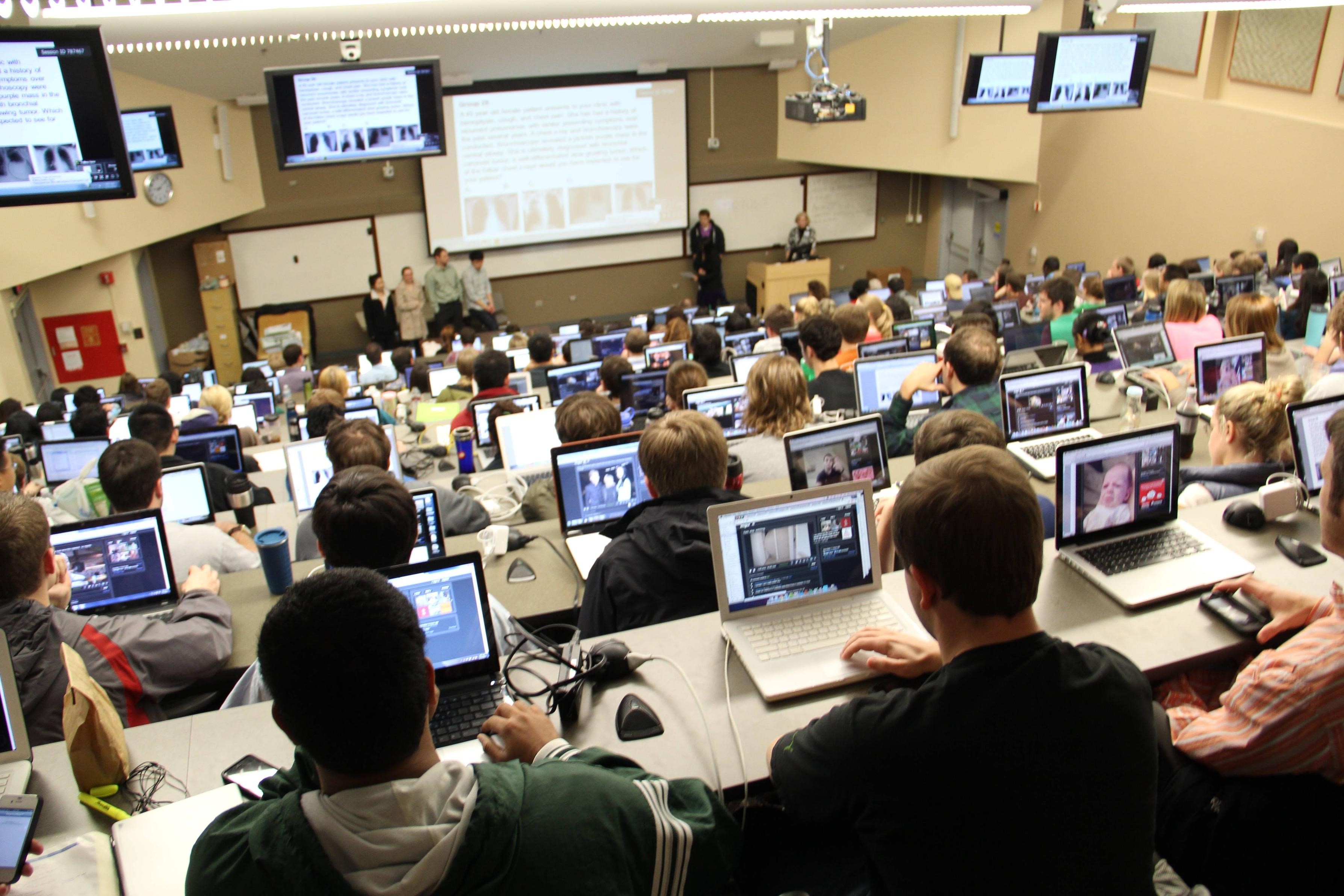Laptops are a valuable tool for student learning. So, why do so many professors prohibit the use of them in class? As someone who has a laptop ban in four out of my five classes this semester, I’m here to tell you that the reason might be more complicated than you think.
The controversial issue of whether or not students should be allowed to use laptops in class has had many outspoken people on both sides. Proponents of laptop use in class definitely have a compelling case. First, they argue, students can look up facts while in class, and if they find something of interest, they can share what they’ve just found online with the class or the professor. They can also use the internet or online dictionaries to verify what they may not hear correctly in lecture, such as a date of a battle or the spelling of a world leader’s name. This helps both the student and their peers learn better.
Another reason that professors would let students use their computers in class is that students can save money and resources by bringing their laptop to class. While laptops are not cheap, the vast majority of college students manage to buy one for college, since computers are necessary for completing many assignments. By having notes and handouts all online, students don’t have to spend money on printing, and they also are saving paper and ultimately trees in the process. It is also easier for them to access their notes, since they are all together in one place. This means less people walking around with a twenty-pound backpack filled with five different notebooks that they need to hunt through to find notes on last month’s lecture.
There are also several students, myself included, who take better notes on a laptop than in a notebook. First, students can usually type much faster than they can write. Not only does this allow them to take down more notes during class that they can later look over, but it also allows them to get down all of the necessary information in a legible manner.
I know that personally, my handwriting isn’t very good. This often discourages me from looking back over my handwritten notes, especially because sometimes I can’t even read what I’ve written. I also don’t always have time to jot down everything important that the professor says when I am hand-writing my notes, because I simply can’t write fast enough. This problem is resolved when I use my laptop in class, because typing is both quicker and less sore on the hands than writing.
Some teachers also like to keep their classroom environment interactive. By using laptops in class, students can take part in polls, surveys or other participatory activities in a way that is usually quicker and easier to organize. So, after hearing all of that, don’t you think laptop use in class is a marvelous idea? I do, too. However, there must be a reason (or a few reasons) why so many educated professors don’t want their students using laptops, insisting that the drawbacks outweigh the benefits.
Advocates of a laptop ban argue that laptops are a source of distraction during lectures. They say that students use the internet to look up facts or questions during lectures and that this leads them to miss information that the teacher is sharing, since they are absorbed in what is on their screen. Or, the students use laptops for research unrelated to class.
Maybe a boy is Facebook-stalking a girl who he thought was cute from his last class. Or maybe a girl is online-shopping for an outfit to wear to her next date-night. Professors also believe that students send emails and text messages from their computers during class instead of paying attention—which is hard to argue against, since I have witnessed plenty of students jumping back and forth on their screens between taking notes and online-chatting with friends.
This distraction isn’t only a problem for the students on the laptops, but it can also lead to the distraction of surrounding students, who stare over with curiosity at the video the student in front of them is watching or at the screen that keeps constantly changing to their left. It can even distract the professor, since watching a room of students all staring at their screens instead of at you can be a bit disconcerting and can lead you to wonder what it is on their screens that they are so enthralled in.
The discomfort a professor might feel while standing in front of a lecture hall filled with students staring at their laptops instead of at him or her is intensified even more when in a small discussion group or seminar. If a professor feels like he or she is speaking to themselves when in a smaller classroom setting because all ten of the students in the classroom are staring intently at their laptops, the professor can’t help but feel like they are vying for your attention while you all look at something more interesting on a screen.
Other professors cite studies that support the idea that students learn better when they handwrite notes as opposed to taking notes on a laptop. They argue that students retain the information better because they do not have time to write down PowerPoint slides verbatim but rather are forced to listen carefully to what the professor is saying and pick out the most important parts to write down. They attribute the distraction of working on a laptop and attempting to multitask to students receiving lower grades in classes. And so, they ban laptops from their own classes and encourage others to do the same.
I had a professor last year who had the TAs sit in the back of the lecture hall, where they could see the screens of the students using their laptops. If they saw someone goofing off or not simply taking notes, they would ring a bell, and everyone would have to close their laptops for several minutes before they could reopen them to continue taking notes. This didn’t help anyone focus; rather, it stirred up anger in the students, that they were being treated like animals who needed to respond to the ring of a bell.
Are there solutions that can work as moderating forces, with limited laptop use or a laptop section of the classroom? Most likely. But, I think it’s important for professors to remember that students are paying for every minute that they are sitting in a classroom, and everyone learns differently. Sure, many students understand that there are studies advocating for a laptop ban and that they may not focus 100 percent of the time they are in class when they are on a laptop. But, if it works for them, I say let them use their laptops, and give them the benefit of the doubt.











